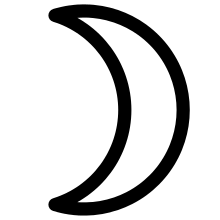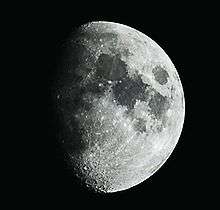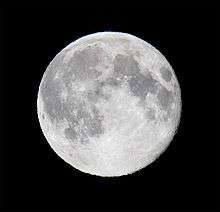Moon
English

The Moon's astronomical symbol

The Earth's moon.
.jpg)
The Moon (waning crescent)

The Moon (full)
Alternative forms
Etymology
From Middle English Mone, mone, from Old English mōna, from Proto-Germanic *mēnô, from Proto-Indo-European *mḗh₁n̥s (“moon, month”), from *mē-² (“to measure”)
Pronunciation
Audio (US) (file) - Rhymes: -uːn
Proper noun
Moon
- The Earth's moon; the sole natural satellite of the Earth, represented in astronomy and astrology by ☾.
- (paganism) The god of the Moon in Heathenry.
- 1994, Tony Linsell, Anglo-Saxon Mythology, Migration & Magic, Anglo-Saxon Books, →ISBN, page 15:
- Moon, the companion of Night, waxes and wanes, and we call this time a month.
- (Can we date this quote?), Falcon Stow, An Anglo-Saxon Almanac, privately published, page 13:
- Moon's Day.
- 2005, Diana Paxson, Taking up the Runes, Weiser Books, →ISBN, page 328:
- Sun come, Moon come, Seed time, dry time, fog and rain, Sowing, growing, reaping, resting, Sun come, Moon come, etc.
-
- A surname.
- The 54th sura (chapter) of the Qur'an.
Synonyms
Translations
sole natural satellite of the Earth
|
|
54th sura of the Qur'an
|
|
- The translations below need to be checked and inserted above into the appropriate translation tables, removing any numbers. Numbers do not necessarily match those in definitions. See instructions at Wiktionary:Entry layout#Translations.
Translations to be checked
|
See also
| Solar System in in English · Solar System (layout · text) | ||||||||||||||||
|---|---|---|---|---|---|---|---|---|---|---|---|---|---|---|---|---|
| Star | Sun | |||||||||||||||
| Planets and dwarf planets | Mercury | Venus | Earth | Mars | Ceres | Jupiter | Saturn | Uranus | Neptune | Pluto | Haumea | Makemake | Eris | |||
| Notable moons | — | Moon | Phobos Deimos |
— | Ganymede Callisto Io Europa |
Titan Rhea Iapetus Dione Tethys Enceladus Mimas |
Titania Oberon Umbriel Ariel Miranda |
Triton | Charon Hydra Nix Kerberos Styx |
Hiʻiaka Namaka |
— | Dysnomia | ||||
This article is issued from
Wiktionary.
The text is licensed under Creative
Commons - Attribution - Sharealike.
Additional terms may apply for the media files.